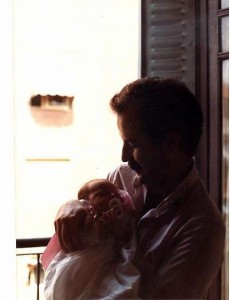By: Becky Larson
 Silvia Regodon, City of Lakes Waldorf School’s Spanish teacher was just two weeks old when this photograph was taken in 1988, the year our school was founded. She was born in Villahermosa, a little village in the center of Spain, and her family moved to Madrid shortly afterwards. They still own the apartment where the photograph was taken. Her father’s job with a sugar company took the family to Jerez in the far south, not far from Africa. Silvia lived there for fifteen years, and describes it as a vibrant, wild place filled with flamenco music and dancing. She spent most of her time being free in nature. When she was 15 years old, her family moved north, and the culture shock was dramatic. Silvia attended an all girls Catholic school, and describes the culture of the north as very posh and a little snobbish. She moved to Madrid to attend the university and begin her career.
Silvia Regodon, City of Lakes Waldorf School’s Spanish teacher was just two weeks old when this photograph was taken in 1988, the year our school was founded. She was born in Villahermosa, a little village in the center of Spain, and her family moved to Madrid shortly afterwards. They still own the apartment where the photograph was taken. Her father’s job with a sugar company took the family to Jerez in the far south, not far from Africa. Silvia lived there for fifteen years, and describes it as a vibrant, wild place filled with flamenco music and dancing. She spent most of her time being free in nature. When she was 15 years old, her family moved north, and the culture shock was dramatic. Silvia attended an all girls Catholic school, and describes the culture of the north as very posh and a little snobbish. She moved to Madrid to attend the university and begin her career.
It was at the university studying English Philology, that Silvia first encountered Waldorf education. During her master’s degree program, each student completed a research project on an educational methodology. As she explored different options, Silvia came upon the Waldorf approach. “I loved that there are no tests and no textbooks in Waldorf,” she says. “Sometimes I feel that textbooks can completely erase the personal approach that teachers can put in their lessons.” The way Waldorf education nurtures a strong connection between children and nature felt familiar to her, because of the way she had grown up. Silvia attended educational conferences and had a sense that the Waldorf movement was strong in Spain and that it would be meaningful to be a part of it.
As a girl, Silvia loved to play school. She had a tiny blackboard and she lined all her dolls up in front to learn their lessons. As early as 7 years old, Silvia was fascinated with language. “I love the different ways to structure a message, the melody of each language, and the connection to the culture. Language is power,” says Silvia. “In [ancient] Rome it was that way!”
Silvia first came to the United States two years ago after getting a grant to teach as an assistant at Robinsdale’s Spanish Immersion School. “I knew no one, and lived with a host family,” says Silvia. “I really like the city and the lakes, but I do hate the cold!” During that first year, she met her husband who is also from Spain. Silvia wasn’t sure what to do when the year was up, but she knew she wanted to keep teaching. She was delighted to discover that there was a Waldorf school right here in Minneapolis. “It is amazing how destiny can be sometimes,” exclaims Silvia. “When I clicked on employment, I thought, I don’t believe it, there is a full time Spanish position!”
She sensed the difference at City of Lakes Waldorf School immediately. “It was so different from public school,” she says. “The children showed me their little pet guinea pig. I felt that kids could be kids here. In mainstream education, so many of the teachers are obsessed with tests, and many of the children are taking medication. It really surprised me.”
Her first year at City of Lakes Waldorf School has been very busy and demanding. Preparing different lessons for eight different grades, and a range of developmental levels has been challenging for Silvia, especially because she is a bit of a perfectionist. “It’s a big job, and I am busy with creating curriculum, and always thinking about what lessons can I bring to them,” says Silvia. She loves the culture of the school, and says she feels more at home here than anywhere else in the United States. “Here, people are cultivated, and they are well read, and have traveled,” says Silvia. Since the heart of her work is to bring the children an experience of another culture through language, she appreciates having such fertile ground to work in.
She describes the change she’s watched as the children became accustomed to her accented English. They used to laugh and tease, but now, one child always points out that it’s not respectful to make fun of an accent when someone is mastering another language. “I do their American accents in Spanish to show them that they have an accent too,” she says playfully. Giving the children a perspective on the varieties of Spanish culture is great fun for her. “It’s important to give kids a different vision of the world.” She loves the unconventional way the little ones use language too. “One little girl said the other day, ‘My feelings are hard,” and I love those poetic things children say,” says Silvia.
Silvia has had a busy year, building new curriculum and being a newlywed, all far from her family and home. She is looking forward to summer training at Antioch University this summer, which will focus on developing curriculum for 6-8th graders, as well as some time in Spain with her family. “There is a lot of work here still to do, so I must keep going,” says Silvia. “People are so supportive here, and that makes this place so human. The kids can feel it too.”

